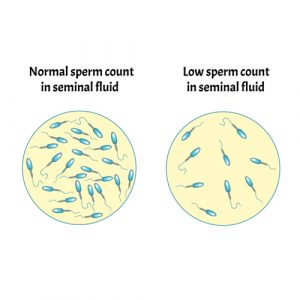Are you curious about the types of infertility in men? Many think of only a low sperm count, but in our quick guide, we analyze five major types of male infertility.
Male infertility is any condition that curtails the man’s ability to make his female partner pregnant. From low testosterone levels to abnormalities in the sperm, many things can go wrong in the complex male reproductive system. Fortunately, urologists have an array of treatments and natural remedies that can enable an infertile man to father a child.
Male Infertility
The following are the prevalent types of male infertility.

Treatments include D-aspartic acid (D-AA) amino acids that promote healthy sperm production, vitamin C and D supplements and scrotum surgery. The pituitary gland regulates the production of testosterone that regulates spermatogenesis in Sertoli cells. Ask your doctor to undertake a thorough diagnosis to identify lumps, swelling or any other prostate and sexual problems.
These are defects in the quality of sperm. In addition to having the right sperm volume, normal sperm should move effectively (motility). Sperm morphology is also critical. The rounded heads and long tails help them reach your partner’s egg easily.
Abnormalities result from genetic conditions, drug abuse, chemotherapy and other medical conditions. In some cases, sperm disorders can be reversed through natural remedies that include folate supplements, fenugreek, selenium and CoQ10 antioxidants that improve the morphology.
The sperm production process requires normal functioning of the testicles, pituitary glands, and hypothalamus. Most couples that encounter this problem end up using sperm from a donor or adopting a child. Fortunately, it’s possible to impregnate your partner through in-vitro fertilization or intracytoplasmic sperm injection.
Most of the common issues revolving around male infertility include hormonal imbalances and blockages in the reproductive system. When the epididymis is inflamed, it’s almost impossible to carry sperm from the testes to the vas deferens.
Sexually transmitted diseases, such as gonorrhea and chlamydia, are the main causes of genital tract infections. Urinary tract infections (UTIs) and prostate infections can also cause epididymitis.
Some of the most common symptoms include swelling in the scrotum, painful urination or ejaculation, enlarged lymph nodes in the groin and bloody urine. After ultrasound or urine sample tests, antibiotics can cure this condition.
Varicocele is the enlargement of arteries and veins within the scrotum. This condition leads to infertility by contributing to low sperm production and poor quality. It results from defects in the testicular valves that inhibit the blood flow to and from the testicles. When the veins dilate, they lead to poor blood circulation and the destruction of sperm.
High temperatures can also affect the normal functioning of the testes and lead to the production of low-quality sperm. Varicocele is also common among men with undescended testicles (cryptorchidism). Testicular torsion surgery is an excellent remedy when it comes to treating varicocele.
Retrograde ejaculation is a significant cause of infertility as semen enters the bladder instead of emerging via the penis. It results from an enlarged prostate, depression, high blood pressure or anything that affects the reflex muscles at the opening of the bladder.
Unfortunately, many men who resort to steroids can aggravate the problem as these chemicals cause further shrinkage of the seminal vesicles or even lead to permanent impotence.
Treatments include midodrine, imipramine and phenylephrine tablets. Having dry orgasms or semen in your urine are some of the common symptoms of retrograde ejaculation.
When to See a Doctor
If you and your partner are unable to get a baby due to male infertility, there are lots of treatments that can reverse the problem. First, your doctor will conduct a general examination and ask questions about your family history and specific problems that you might have. Then, a semen analysis will shed light on any abnormalities in the sperm so you can get the proper medication.




